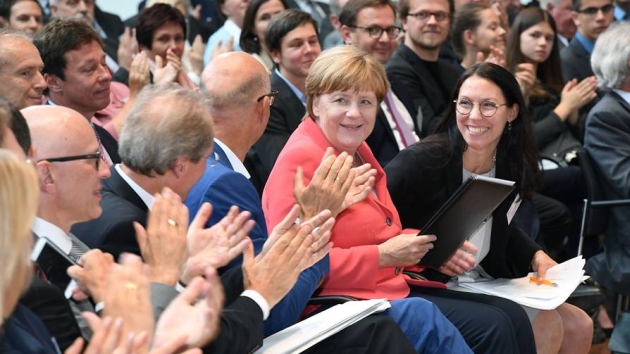The subject of education and digitalization is at the focus of the 4th National STEM Summit. The keynote speaker is German Chancellor Dr. Angela Merkel. With this event, the “Nationales MINT Forum” (German STEM Forum) aims to initiate a debate on how Germany has to shape the digital transformation so that as many people as possible benefit from it. The public education system and business community will play a key role in that. Digital competencies should have long been an integral component of a good general education. They will more than ever be a prerequisite for career success and self-determined participation in the digital society.
The German STEM Forum is the national platform and mouthpiece for STEM subjects (science, technology, engineering, and mathematics). The initiative, which is made up of more than 30 nationally-active scientific institutions, foundations, and professional associations, has campaigned for years to improve STEM and digital education. At the 2016 National STEM Summit, members formulated six core demands for better digital education. The target groups include education policymakers and institutions, as well as the business community and public administration.
Core demands to strengthen digital education
The ministries responsible for education in the federal states are called on to introduce “compulsory hours” and appropriate concepts for digital education, where possible integrated in the entire curriculum, including computer science. The Forum also believes that schools themselves and their staff have an obligation: Digitalization necessitates a cultural change among staff. Teachers who are lone fighters are no longer needed; stronger cooperation between them is needed in future. “Digitalization offers staff the chance to establish a new culture of cooperation and formulate extensive concepts for the development of lessons, forms of organization and personnel. The educationally sensible use of digital media should become an everyday standard,” says Dr. Nathalie von Siemens, spokesperson of the German STEM Forum.
The Forum urges that reforms in teacher training are necessary. For example, many teachers still shied away from using digital media in their lessons because they had never learned how to use them in a educationally and didactically sensible way. New training and continuing education standards might be a remedy here and have to be entrenched in all teacher training institutions.
“The digital transformation is proceeding at full pace,” emphasizes Thomas Sattelberger, spokesperson of the German STEM Forum. “The objective now is to get as many people on board as possible in order to seize the digital opportunities and leverage them ideally for our society. It is not only schools and universities that play a major role in enabling better digital education. Companies and public administration must also live up to their responsibility by doing their all to avoid a digital divide among their employees by means of qualification drives.” Universities should be strengthened in their third mission and encouraged in founding companies and providing continuing education.
The six core demands and the strategy paper from the working group “Digital education for children and youngsters” can be downloaded from the website of the German STEM Forum at http://www.nationalesmintforum.de/pressemitteilungen.html.



